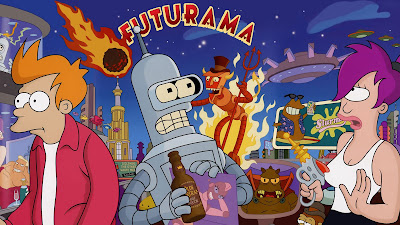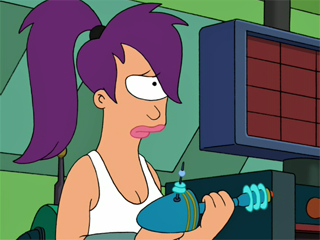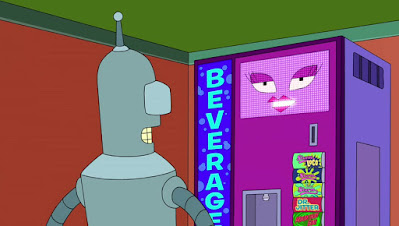This post is going to contain spoilers for Futurama. If you don't want major points of the show spoiled, then it might be a good idea to avoid this post.
*
I'm not sure I'm going to think of the future more than I have this year. With things seemingly getting more and more bizarre, imagining how humanity is going to progress in, say, 1000 years can be a fun or, alternatively, absolutely terrifying experiment. Fortunately, I don't have to imagine too much for myself because Matt Groening already did all the thinking for me in the late 90s when he thought up Futurama, an animated science fiction sitcom set in the year 3000.
Futurama is
not just an excellent show. It almost feels revolutionary. I've never seen
a cartoon for adults that is able to interrogate both the tropes of the sitcom and
the tropes of the episodic sci-fi show before, and I'm not sure I'm going to see one again. Watching it has a child and rewatching it again as an adult living through worldwide pandemic have been vastly different experiences. Firstly, I have more of an understanding of the world which means I understand more of the jokes about hating your job and accidentally ending the universe. (Y'know, adult things).
I've also been able to think more about what the world-building in this show suggests in terms of what the show creators think the future will look like. As Thomas Moylan writes, the world of science fiction has the ability to 'produce critiques of and alternatives to the prevailing social order'. What I want to explore here is the extent that this show is transgressing the hegemony of the late 90s/early 2000s as well as how the limited perspectives of the producers have hindered this show in terms of imagining a utopia in which marginalised groups are not oppressed, unintentionally implying horrific things about humanity in the future.
 |
| Source: Digital Spy |
The show sees
the future in what seems like its most advanced state. Technology, such as
travelling pipes and spaceships, is available to everyone, to an extent. 1000
years in the future, our vehicle for exploring a society that is almost the same but mostly
different is Philip J. Fry, a man who is dissatisfied with his job, his family
and his relationship. This is a well established trope in science fiction; Moylan explains that the protagonists of these stories are 'spacetime travellers' who 'act in the name of a self-interested effort to be more fully themselves in a difficult place'. Fry is the character who has to acclimate to his new surroundings and he does this by learning about this new world at the same time as the audience. He becomes the person who asks the question about how the
world functions and (most of the time) he is given straight forward, if not, disappointing answers. The most humorous example of this is in the episode 'The Series Has Landed' in which Fry expresses his excitement to be going to the moon only to find out how easy it is go there, further disappointed by the fact that it has become a tourist destination.
Despite this, the extremely technologically advanced society has the answers for most of the problems Fry had in his previous life. As Moylan goes on to state, our sci-fi protagonist is striving to be 'actively part of a found community of people who are also dislocated and no doubt dispossessed and disempowered, and who are posing similar questions to the entire social reality'. And Fry finds this in the first episode of the show in a cyclops with no family named Turanga Leela and a suicidal robot named Bender.
 |
| Source: Screen Rant |
What the sci-fi genre does for the show is use the threat of alien invasion, the technology of cloning and time travel and the quick and easy space travel as tools to express current day desires and fears. And by current day, I do mean the early 2000s liberal American desires and fears. When this is blended with the animated sitcom format, what is produced is an expression of the absurdity of everyday life being amped up to the extreme.
What if Fry accidentally kills his grandfather and ends up having sex with his grandmother? What if humankind was enslaved by giraffes? What if, after jumping to his death, Fry pushes a button so he travels 10 seconds into the past, keeping him in a perpetual loop of falling forever?
The possibilities are truly endless. And by endless, I mean very limited by the very white, very straight men who wrote the show.
Now, this isn't where I get on my high horse and complain that queerness and non-whiteness are not well-represented and therefore, this is a bad show. I've already expressed that I really love this show. What I am arguing is that by representing this world in a way still marginalises queerness and POC, that still has capitalist patriarchy in place, the writers have unknowingly created an extremely bleak future. Despite the advancements, gay and trans people are still mocked; homelessness still exists; the police still functions as an extension of capitalism and white supremacy. What has been created here is a world in which Fry can flourish more than he did in the present, and because of this, not much else can be transgressed beyond the surface level advancement of technology.
 |
| Source: Engadget |
When overthinking this animated TV show, a question came about in my mind: with all of the above considered, could Futurama be viewed as a utopia? Does is have enough qualities to be considered a best case scenario for the human race?
Ruth Levitas and Lucy Sargisson argue that what makes a utopia is its ability to explore 'alternatives [to our current society] in a way that supports or catalyzes social transformation'. If we are to purely go off of Fry's perspective then I'm sure the above would make Earth in the year 3000 a utopia, as Levitas and Sargisson argue that the creation of such worlds is an expression of 'the desire for a better way of living'. Fry being conveniently transported away from his boring, miserable life to one full of adventure, love and friendship would be enough to qualify. But what Levitas and Sargisson go on to argue is that for a utopia to be transformative, it must 'disrupt the structural closure of the present', meaning it must meaningfully critique what is the status quo.
Though this
show does plenty to critique ideas like capitalism and the way we view workers and bosses,
it is extremely disheartening to see that even 1000 years in the future, the
writers could not imagine a world in which the economic hiearchies didn't still benefit the bosses and that people are still struggling to pay to be alive.
One of the most bleak examples of this is the recurring gag of the suicide booth, featured in episode 1. Fry mistakes this for a phone booth and is nearly murdered as he enters it to make a phone call. The most troubling part of this throwaway joke is that people have to pay to use this booth, meaning someone, somewhere is making money off people killing themselves. Lyta Gold argues that much of science fiction is a 'rebellion against bourgeois liberalism and capitalism’, meaning that the above example reflects on how soulless our current system is. For me, however, this very dark joke seemed to just cut through the liberal veneer of this world that had been created. The technology has been created to benefit those who are already in power, offering quick solutions to problems that could be solved with real world reform. This one joke was actually the catalyst of me wanting to write this. I could not get out of my head how dark the subtext of this world was. There was no way a utopia could exist if people still wanted to die in it and furthermore, could not exist if someone was profiting off the results.
 |
| Source: Screen Rant |
Speaking of that which lies beneath the surface, the world of Futurama is one that is still very white and very straight. As the series progresses, so does the series' politics, giving side characters like Hermes and Amy whole episodes to explore their inner lives, as well as becoming marginally better at making less gay jokes. Only marginally though. An egregious example of this is in the episode 'Roswell That Ends Well', where Fry is sent back in time to interact with his grandparents. When his grandfather, Enos, expresses queerness and even questions his sexual identity, which is framed as joke to emasculate the character, Fry expresses anger at this. The logic of this is that if his grandfather is not straight, then Fry might not be born. His anger is framed as justified and, more importantly, funny. As Damien Walter states, sci-fi still 'clings to an unrealistically straight vision of the future’.
In terms of race, as stated above, sometimes the show focuses on its characters of colour but these experiences are still filtered through a white gaze and even more, through a post-racial lens, in which discussions of racial inequality are non-existent. If they are not non-existent, then they are heavily coded onto aliens, robots and machinery. A particularly awful example of this is in the episode 'The Bots and The Bees', where we are introduced to Bev the vending machine. Voiced by Wanda Sykes and heavily coded as black, she is a brief object of lust and hatred for Bender, who accidentally conceives a child with her. She abandons her child and only wants him back once she can gain something from it. She is presented in opposition to Bender as a parent, who was doing quite well at parenting. She threatens to chain her son to a radiator and later brags about how she is going to neglect any children she may have in the future. Just add more to the shit sandwich this show created, it is implied that she is both working class and had previously been a sex worker.
My main gripe with the show is not that its perspective is limited by the people who wrote it: that's to be expected. It's that, with all the creativity of this show, no one making it could imagine a world in which discussions of gender and sexuality had advanced beyond the odd joke. That issues of race were relegated to that of invisibility or horrific stereotyping. As Gold observes, science fiction has 'a long and ugly history of projecting race and class-based anxieties on inhuman Others’.
I suppose that it's a good thing that a strong female character, who is also a mutant, is part of the main cast. Leela, though flawed in her creation in many ways, is a step up from most women in science fiction. Marianne Kac-Vergne observes that 'women rarely play more than a bit part in science fiction films centered almost exclusively on male heroes'. In making Leela an active part of the plot, someone who has adventures outside of the protagonist of the show, allows the character to transgress many of the stereotypes laid on the strong female sci-fi character.
She only has one eye, making her the Other in many circumstances. In fact, when Fry firsts meets her, he is initially attracted to her until she turns around and reveals that she is a cyclops, where he reacts in disgusts. This marginalisation is something that she has become accustomed to, only really reacting with a groan and a casual threat of violence before continuing on with her job. Capitalism demands that she ignore any kind of harassment she is facing as it may prevent her from performing her role correctly. Throughout the show, she shows proficiency as a spaceship pilot, with the odd 'women can't drive' joke thrown in, as well as a skilled fighter. She is fiercely loyal to her friends and seeks to protect them whenever she can. Often times, she is the one saving Fry.
But as the show goes on, what I observed was that much of this punch that made her character so interesting was taken out, so that she could be relegated as simply Fry's girlfriend. Much of her function in the later seasons is being angry at Fry for being a bad boyfriend, the most obvious example being in the episode 'The Late Philip J. Fry' where Leela becomes increasingly annoyed at the fact Fry can never seem to make it on time to a date. When Fry is thrown forward in time and Leela believes that he has died, she goes on to lead a miserable life, with a successful business but no true love. Without our male protagonist, Leela's life is truly empty.
In relation to this issue in sci-fi, Kac-Vergne argues that:
'active female characters have been introduced in the science fiction genre as an act of feminist tokenism, giving the illusion that women have gained power in a postfeminist America. However, they are almost systematically marginalised, so that their main function is in fact to act as mirrors that reflect the male hero, delineating the contours of masculinity within a male genre concerned with male anxieties.'
 |
| Source: All The Tropes |
What Futurama has expressed best is that it can only really respond to its time period in a way that critiques what the writers are aware of. If they don't experience gendered, racial or sexuality based oppression, why would this need to be addressed and amended for a future society? A lot of the time, the producers of this show will have to construct adversity and oppression for the characters to come up against, hence why it is an alien race seeking to cause humanity trouble rather than any real world problems. Once again, this is an issue built into the sci-fi genre.
When I look to the future, my version is hopeful. I think. This show provides a window into the creator's minds, looking at how technology has aided and hindered us, but seemed to miss how we might have transgressed passed arbitrary structures in place. I'm not sure the show wanted to be a utopia. It seems to want to be what our protagonist, Fry, wanted from the future. A place that was essentially the same - same job, same structures of power - but that allowed him to be loved by his friends and girlfriend in a way that he never was in his own time. Escapism for one group is still a massive pile of shit for others, but I'm not sure I can blame the show for having such a limited imagination of what Earth will look like thousands of years in the future. Because at least the Earth still there.
*
Thank you for reading this blog post! It took me very long time to get this written because my mental health took a massive dip and I had a mountain of research to get through.
I've compiled some extra viewing in this playlist - these are some videos that familarised me with the sci-fi genre and the concept of utopias. If you'd like to learn more about any of the topics mentioned, feel free to check it out!
Sources:
Lyta Gold, ‘Sci-Fi, Fantasy, and the Status Quo’, Current
Affairs <https://www.currentaffairs.org/2017/10/sci-fi-fantasy-and-the-status-quo> [accessed 10/12/2020]
Marianne Kac-Vergne, ‘Sidelining Women in Contemporary
Science Fiction Film’, Miranda, 12 (2016), 1-16.
Ruth Levitas and Lucy Sargisson, ‘Utopia in Dark Times:
Optimism/Pessimism and Utopia/Dystopia’, in Dark Horizons: Science Fiction
and the Dystopian Imagination, ed. by Raffaella Baccoloni and Tom Moylan
(New York: Routledge, 2003), pp. 13-28.
Thomas Moylan, Scraps Of The Untainted Sky: Science
Fiction, Utopia, Dystopia (Colorado: Westview Press, 2000).
Damien Walter, ‘Science fiction needs to reflect that the
future is queer’, The Guardian <https://www.theguardian.com/books/2014/apr/11/science-fiction-needs-to-reflect-queer-fluid-gender-identity> [accessed 10/12/2020]
